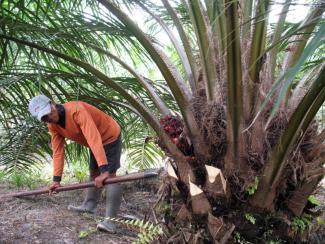Labour rights
Unachievable targets

Sumatra was once considered the most luscious and green island of Indonesia, and in some ways, this mountainous island still is. However, much of the rainforest has been transformed.
Sumatra is the world’s sixth largest island. It produces rubber, sugar cane, soy, coffee, cocoa, bananas, pineapples, rice and other goods. Palm-oil plantations increasingly mark agriculture, because previously high demand encouraged some rubber and cocoa farmers to switch to palm trees.
Plantation workers must cope with harsh conditions. For instance, they have to collect a certain amount of palm fruits every day. If they miss the target, their salary is reduced. At an event hosted by the Legal Aid Institute in Jakarta, one worker said: “It is just not doable.” He does not want to be named because speaking publicly about the conditions on the plantations would jeopardise his job. For the same reason, he does not want his employer to know that he started and joined a trade union. The Legal Aid Institute supports this organisation. The union cannot operate effectively, however, as members often need to keep their membership secret. In this article, his name will be Alpha.
The Coalition of Palm Oil Workers, an umbrella network of various organisations, demands the Indonesian government to recognise palm-oil labourers – including day labourers – as workers, uphold basic rights such as the right to organise and have a union, to uphold the welfare of labourers above investors’ interests and to protect vulnerable groups including women and children and eliminate discrimination against them.
To do the job at all, Alpha had to invest 2 million rupiahs (the equivalent of 143 €) in basic equipment, including gloves, a cart and a machete. That was more money than he takes home in a month. According to Alpha, his official pay of about 2,3 million rupiahs (154 €) a month corresponds to the minimum wage of the North Sumatra region. In reality though, he earns much less.
At the end of the month, Alpha’s salary is reduced by various “fines”. He must pay penalties for not fulfilling the daily quota, for unripe fruit clusters, for damages to harvested fruit clusters and other things. A single ripe palm fruit dropped and left on plantation grounds costs him 2500 rupiahs (0,17 €). At the end of the month, these fines can amount to half of the stipulated payment. Alpha says he feels lucky when he receives 60 % of his official salary.
Alpha says he needs the help of his wife and children to make the target of two tons per day. His income is thus the total family income. There is no such thing as over-time payment, and it is hard for wives to make extra income elsewhere, when it takes the family more than eight hours to collect the two tons.
Organising unions
Two tons of palm-oil fruit is equivalent to approximately 80 fruit clusters, each cluster weighing 25 kilogrammes. To reach the daily target, harvesters need extra hands – usually their wives and children – who do not get any extra pay. Starting at daybreak, the family works as a team. Mother and children collect the felled palm fruits and cart them down the long dirt road to the oil mill where the produce is weighed and processed. Usually, Alpha’s family returns home in the evening to eat, sleep and prepare for the next day. Even the youngest babies are brought along to work since there is no one to look after them.
Palm plantations are huge, and not all trees can be harvested at the same time. Full grown palm trees are about 16 meters tall. Only few Indonesians still know how to climb the trees in the traditional way, pushing themselves to the top with their feet and arms holding on to the tree. In the beginning of a season, palm-oil workers must walk three kilometres to get to the harvesting areas. Later, they must hike further into the plantation, often walking ten kilometres to get to an area that can be harvested.
There are no amenities on plantation grounds. Workers must turn to the wild to relieve themselves. This is not always safe: recently two female day labourers were attacked by crocodiles along a swampy riverbed, Alpha reports.
Women at risk
According to Renata Sandhi from OPPUK, a civil-society organisation promoting the development of social enterprises, plantation work is much more dangerous for women than for men. They face gender-specific health risks, she says. Moreover, they are more likely to be sexually harassed when working alone on large plantations.
Apart from supporting harvesters, who are typically men, women do specific jobs. They are given the task of fertilising palm trees, which includes carrying the 18 kilogramme fertiliser bags across the plantation. Often, they are also responsible for spreading herbicides. Both tasks expose women labourers and accompanying children to chemicals. There are serious health risks, especially during pregnancies. The women are required to wear masks, protective clothing and gloves, but the rules are not enforced stringently. The workers have to buy their own gear, which is costly, so many choose to do without. Children mostly have no protective gear at all.
OPPUK demands that no additional land be devoted to palm-oil production. However, the non-governmental organisation is not calling for plantations to be turned into secondary rainforests again. It supports the Coalition of Palm Oil Workers and wants plantation workers’ children to be sent to school.
EU curb on imports
The price of crude palm oil (CPO) has dipped in the past few years. For environmental reasons, the European Union plans to curb palm-oil imports. This plan has put a slight damper on investor interest. Indonesia and Malaysia consider the policy discriminatory. If the EU passes a binding directive on the matter, the two countries may take the issue to the World Trade Organization (WTO).
In Southeast Asia the demand for palm-based cooking oil is growing. Investors, the government and labour organisations seem to agree that a balance between people’s welfare, investors’ profit and Indonesia’s economic needs must be struck.
The Indonesian Palm Oil Association recently called for an alternative approach to land and production ownership. It suggested two models for developing partnerships to establish plantations on territories belonging to traditional communities. In the first model, the traditional communities would manage and maintain their plantation as communal cooperatives. In the second model, members of traditional communities would act as labourers who hold shares in the company. In both cases, land rights would remain with the traditional communities.
So far, however, the labourers are basically denied their rights. Currently, approximately 40 % of Indonesia’s 255 million people work in the agricultural sector in rural areas. The fate of landless day labourers is generally tough, not only on the plantations. Whether their voices – and those of environmental activists – are heeded, will be determined by how well the government enforces its regulations and laws.
Edith Koesoemawiria is a freelance journalist.
hidayati@gmx.de











